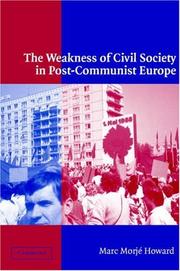| Listing 1 - 2 of 2 |
Sort by
|
Book
ISBN: 9780521691277 9780521870771 0521691273 0521870771 9780511819124 9780511632860 051163286X 9780511651953 0511651953 0511819129 9786612393914 6612393912 9780511631658 0511631650 0511847599 1107210380 0511647875 128239391X 0511634064 Year: 2009 Publisher: Cambridge Cambridge University Press
Abstract | Keywords | Export | Availability | Bookmark
 Loading...
Loading...Choose an application
- Reference Manager
- EndNote
- RefWorks (Direct export to RefWorks)
In this book, Howard addresses immigrant integration, one of the most critical challenges facing European countries, the resolution of which will in large part depend on how foreigners can become citizens. Howard's research shows that despite remarkable convergence in their economic, judicial, and social policies, the countries of the European Union still maintain very different definitions of citizenship. Based on an innovative measure of national citizenship policies, the book accounts for both historical variation and contemporary change. Howard's historical explanation highlights the legacies of colonialism and early democratization, which unintentionally created relatively inclusive citizenship regimes. Howard's argument focuses on the politics of citizenship, showing in particular how anti-immigrant public opinion - when activated politically, usually by far right movements or public referenda - can block the liberalizing tendencies of political elites. Overall, the book shows the far-reaching implications of this growing and volatile issue.
Citizenship --- Immigrants --- Citoyenneté --- Political activity --- Activité politique --- Europe --- Emigration and immigration --- Government policy. --- Emigration et immigration --- Politique gouvernementale --- Government policy --- Colonialisme (idée politique) --- Frontières --- Émigration et immigration --- Influence --- Histoire --- Politique publique --- Citoyenneté --- Activité politique --- Influence. --- Histoire. --- Emigrants --- Foreign-born population --- Foreign population --- Foreigners --- Migrants --- Persons --- Aliens --- Birthright citizenship --- Citizenship (International law) --- National citizenship --- Nationality (Citizenship) --- Political science --- Public law --- Allegiance --- Civics --- Domicile --- Political rights --- Law and legislation --- Political activity. --- Social Sciences --- Political Science --- Citizenship - Europe - Case studies --- Immigrants - Political activity - Europe --- Europe - Emigration and immigration - Government policy

ISBN: 0521011523 0521812232 0511840012 Year: 2003 Publisher: Cambridge : Cambridge University Press,
Abstract | Keywords | Export | Availability | Bookmark
 Loading...
Loading...Choose an application
- Reference Manager
- EndNote
- RefWorks (Direct export to RefWorks)
Over a decade has passed since the collapse of communism, yet post-communist citizens are still far less likely to join voluntary organizations than people from other countries. Why do post-communist citizens mistrust public organizations? What explains this pattern of weak civil society? And what does this mean for democracy in the region? This engaging study addresses these questions with a provocative argument about the enduring impact of the communist experience on its countries and citizens. Howard argues that the experience of mandatory participation in state-controlled organizations and vibrant private networks during the communist period, combined with the disappointment with post-communist developments, have left most citizens with a lasting aversion to public activities. Howard analyzes the findings from over 30 democratic countries on the World Values Survey and also presents extensive and original evidence from his own research, focused on Eastern Germany and Russia.
Civil society --- Democratization --- Non-governmental organizations --- Société civile --- Démocratisation --- Organisations non-gouvernementales --- -Democratization --- -Non-governmental organizations --- -INGOs (International agencies) --- International non-governmental organizations --- NGOs (International agencies) --- Nongovernmental organizations --- Organizations, Non-governmental (International agencies) --- Private and voluntary organizations (International agencies) --- PVOs (International agencies) --- International agencies --- Nonprofit organizations --- Democratic consolidation --- Democratic transition --- Political science --- New democracies --- Social contract --- -Civil society --- Société civile --- Démocratisation --- INGOs (International agencies) --- Social Sciences --- Political Science
| Listing 1 - 2 of 2 |
Sort by
|

 Search
Search Feedback
Feedback About UniCat
About UniCat  Help
Help News
News